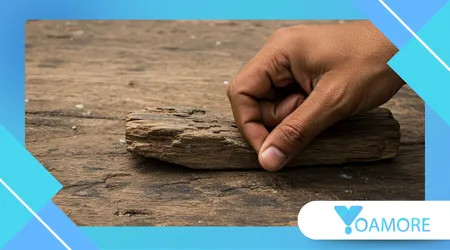Knocking on Wood: Where Did This Superstition Come From?

It happens almost without thinking. You say something hopeful—maybe that you won’t get sick before a trip or that the weather will stay sunny for your wedding—and then you reach for the nearest wooden surface and give it a quick tap.
Anúncios
Knocking on wood has become so automatic that few people stop to wonder where it came from or why it still matters today.
But why do millions around the world cling to this small, strange ritual? Could it be that deep down, we still believe that words have power—and that wood somehow listens?
The Ancient Roots of Knocking on Wood
The exact origin of knocking on wood is difficult to trace, but most scholars agree it predates modern religions and cultures.
Some historians link it to ancient tree-worshipping practices in Europe, where trees were believed to house spirits or gods. By touching or knocking on the wood, a person could summon protection or avoid angering the spirits.
Anúncios
Others suggest the ritual emerged from medieval Christianity, where pieces of the “True Cross” were revered. Touching these relics—or wood believed to be holy—was thought to bring blessings or protection.
A 2020 anthropological study found that over 62% of surveyed people across 15 countries admitted to knocking on wood for luck or protection at least occasionally, even when they did not consciously believe in the superstition.
This suggests the ritual has woven itself so deeply into everyday behavior that belief isn’t even necessary for the action to persist.
Knocking on Wood as Emotional Insurance
Rituals like this serve as emotional insurance. When faced with uncertainty, humans instinctively look for ways to regain a sense of control.
Saying “nothing bad will happen” feels dangerously optimistic—so knocking on wood becomes a way of balancing the scales, a small gesture to “undo” any potential jinx.
It’s not just about luck. It’s about anxiety management. A tiny ritual in exchange for a moment of calm.
Imagine luck as a glass of water teetering on a table’s edge. Knocking on wood is like gently tapping the table to reassure yourself it won’t fall, even if you know the tap changes nothing. The movement matters more than the logic.
Read also: The Sea Nomads: Bajau People and Their Underwater Adaptations.
Original Examples: Modern Adaptations
In a small café in Istanbul, it’s common to see elderly patrons tap three times on their wooden tables after praising a grandchild’s good grades or a friend’s health. The owner once said, smiling, “We knock for the things we fear losing.”
Meanwhile, in a New York design firm, a group of colleagues started knocking on their wooden desks before every big project launch.
One employee joked that it “feels like putting a seatbelt on a wish.” Even in hyper-rational environments, instinct wins.
These examples show that whether spoken in Turkish, English, or whispered silently in thought, the emotion behind the knock transcends borders.
The Psychology Behind the Ritual
Psychologists argue that knocking on wood taps into a cognitive bias called “negativity dominance.” Essentially, people are wired to believe that acknowledging good fortune too boldly invites bad luck.
By performing a small ritual immediately after tempting fate, people soothe the subconscious fear that they’ve upset the natural order.
A 2013 study published in Psychological Science even found that people who engaged in superstitious actions like knocking on wood felt less anxious afterward—and performed better on tasks requiring confidence.
It’s not magic. It’s self-regulation disguised as tradition.
A Ritual That Outlasted Its Origins
Unlike some ancient practices that faded with time, knocking on wood adapted. It no longer requires sacred trees or formal ceremonies.
A simple desk, a doorframe, or even the side of a bench will do. Some people even tap their own heads playfully when wood isn’t available—an improvisation that keeps the emotional logic intact.
This adaptability might explain why the ritual survives while countless others have disappeared. It doesn’t demand belief.
It demands only a moment—a small, physical acknowledgement that we’re hoping for the best while guarding against the worst.
A Question Worth Asking
In a world obsessed with data, forecasts, and control, why do we still reach for wood like ancient villagers reaching for sacred trees?
Maybe because despite all our advances, uncertainty still scares us. And maybe, deep down, knocking on wood is less about superstition and more about staying humble in the face of forces we can’t predict.
Conclusion
Knocking on wood might seem like a trivial gesture, a leftover habit with no place in modern life. But it carries echoes of something older and deeply human—the need to negotiate with fate, to respect uncertainty, to hope carefully.
In every tap on a table, every knuckle rapped against a wall, there’s a quiet conversation happening between fear and faith. It’s not about warding off evil spirits anymore.
It’s about reminding ourselves that while we can’t control everything, it’s okay to hope—and to hope carefully.
Because when luck feels as fragile as a whisper, sometimes all it takes is the solid knock of wood to steady it.
FAQ: Knocking on Wood and Its Meaning
1. Where did the superstition of knocking on wood originate?
It likely stems from ancient tree-worshipping practices where trees were believed to house protective spirits.
2. Why do people knock on wood after saying something positive?
To ward off bad luck and counterbalance the fear of “jinxing” their good fortune.
3. Is knocking on wood considered a global superstition?
While most common in Europe and the Americas, variations of the ritual exist worldwide, adapted to local beliefs.
4. Does knocking on wood actually change outcomes?
There’s no scientific evidence it affects outcomes, but it does help reduce anxiety and promote a feeling of control.
5. What if no wood is available?
Many people improvise by tapping their own heads or nearby surfaces, showing that the ritual’s emotional logic matters more than strict authenticity.
